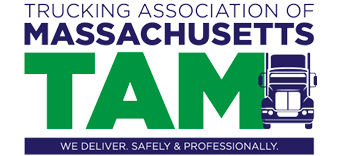TAM Testimony – Opposition to House Bill 3129, and in support of Senate Bill 2141
On Jan. 2, Kevin Weeks, the executive director of the Trucking Association of Massachusetts, submitted written testimony in opposition to House Bill 3129, An Act relative to the use of liquid calcium chloride on state highways, and in support of Senate Bill 2141, An Act relative to commercial fees. The testimony is provided below, and a PDF is available for download.
For additional information, contact the Trucking Association of Massachusetts.
Honorable Joseph Boncore, Senate Chair
Honorable William Straus, House Chair
Joint Committee on Transportation
State House, Room 134
Boston, Massachusetts 02133
Dear Chair Straus, Chair Boncore and Members of the Committee:
On behalf of the over 250 trucking company members of the Trucking Association of Massachusetts (“TAM”), I am writing in opposition to House Bill 3129, An Act relative to the use of liquid calcium chloride on state highways, and in support of Senate Bill 2141, An Act relative to commercial fees.
House Bill 3129 seeks to prevent the use of liquid calcium chloride for the treatment, prevention or removal of snow or ice on roads or bridges within the Commonwealth, or for any other related purpose. As you may know, liquid calcium chloride is used to pre-wet salts as part of an anti-icing strategy. The liquid calcium chloride is applied to dry salts before or during salt application to the pavement. When the liquid is applied to the rock salt particle, it penetrates ice and snow pack better and decreases the loss of salt from traffic action by 30%. The use of liquid calcium chloride as part of anti-icing strategy is proactive in ice control as it prevents ice from bonding to the surface and leads to better pavement conditions, easier clean-up, and requires less chemicals, decreasing the environmental impact.
During winter storm conditions, trucking companies are specifically concerned about the accumulation of snow and ice on the Commonwealth’s roads and bridges. Accordingly, TAM supports strategies that address snow and ice control in as efficient and safe a manner as possible. Calcium chloride is the most widely used non-sodium chloride deicer and provides performance advantages over other deicers as only small quantities are necessary due to its ability to melt ice faster and at lower temperatures. These qualities decrease costs, increase safety, and minimize environmental impact. As a result, discontinuing the use of liquid calcium chloride will likely lead to a number of avoidable harms. Primarily, discontinuing the use of liquid calcium chloride will increase costs by increasing the quantity of salt that must be used on roads and bridges while increasing the likelihood excess rock salt will make its way into sensitive environmental areas adjacent to the Commonwealth’s roads and bridges. Given a National Highway Traffic Safety Administration’s report that Massachusetts has among the lowest road fatality rate in the nation for trucking, now is not the time change a successful process.
With respect to Senate Bill 2141, the legislation proposes to cap fees on any individual fee to no more than 2.5 per cent in a calendar year. As well, the legislation requires the Massachusetts Registry of Motor Vehicles (RMV) to offer a discount for any person registering 5 or more units in a calendar year, including but not limited to, semi-trailers (normal), semi-trailer (reserved), trailer (normal), trailer (reserved). The discount shall be in an amount of no less than 10 percent of each registration fee they would otherwise incur. Finally, the legislation requires the RMV to issue a report to the legislature within 90 days offering recommendations to reduce the cost of operating a commercial vehicle or unit in Massachusetts in order to promote competition with neighboring states.
Just as TAM has argued in favor of eliminating the state’s rolling stock tax, Massachusetts is a comparatively expensive jurisdiction to domicile or operate a trucking company within. Certain taxes and fees on essential aspects of operating a trucking company are simply higher than those in the other New England states. SB2141 would provide a small measure of relief by reducing the potential for large fee increases while also offering a key reduction in costs for fleet registration. To retain the trucking industry’s presence in the Commonwealth, which in turn reduces costs for consumers and creates jobs for residents, there needs to be a competitive environment to foster the growth of this important industry. SB2141 will provide a reasonable and measured strategy for creating a sustainable platform for the trucking industry in this state.
I appreciate your consideration of these two important matters. If you have any questions or concerns, please do not hesitate to let me know.
Sincerely,
Kevin Weeks
Executive Director



